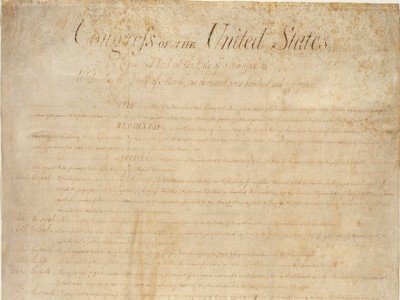Today we celebrate the anniversary of the first 10 amendments, known as the Bill of Rights (ratified December 15, 1791). Here’s what you need to know:
WHAT IT DOES
The 10 amendments that make up the Bill of Rights guarantee essential rights and civil liberties:
-- The First Amendment guarantees the freedom of religion, speech, the press, assembly, and petition.
-- The Second Amendment guarantees the right to bear arms.
-- The Third Amendment prohibits the forced quartering of soldiers.
-- The Fourth Amendment protects people from unreasonable searches and seizures.
-- The Fifth Amendment prohibits people from being subjected to double jeopardy or being forced to testify against themselves; ensures that the government may ony deprive someone of their “life, liberty, or property” through due process of law; and that private property cannot be taken for public use, without just compensation.
-- The Sixth Amendment protects the right to a fair trial by jury.
-- The Seventh Amendment protects the right to a jury trial in civil cases.
-- The Eighth Amendment prohibits excessive bail and cruel and unusual punishment.
-- The Ninth Amendment emphasizes that the listing of certain rights in the Constitution does not mean that those are the only rights that belong to the people.
-- The Tenth Amendment states that any powers not granted to the federal government are reserved to the states and the people.
WHY IT WAS ADDED
One key debate surrounding the creation of the U.S. Constitution was the inclusion of a Bill of Rights. Several delegates at the Constitutional Convention were concerned that without a Bill of Rights, our most important rights would be unprotected. Others felt that a Bill of Rights was unnecessary and that outlining certain rights would imply that those were the only rights reserved to the people. By the end of the Convention, a Bill of Rights was overruled.
The Constitution, sans Bill of Rights, was signed by 39 delegates on September 17, 1787, at Independence Hall in Philadelphia. Three other delegates were present but refused to sign--in part because of the absence of a Bill of Rights: Elbridge Gerry of Massachusetts and Edmund Randolph and George Mason of Virginia.
After the Convention, the absence of a Bill of Rights emerged as a central part of the ratification debates. Anti-Federalists, who opposed ratification, pointed to the missing Bill of Rights as a fatal flaw. Several states ratified the Constitution on the condition that a Bill of Rights be promptly added, and many people offered suggestions for what to include.
WORD-FOR-WORD
Amendment I
Congress shall make no law respecting an establishment of religion, or prohibiting the free exercise thereof; or abridging the freedom of speech, or of the press; or the right of the people peaceably to assemble, and to petition the Government for a redress of grievances.
Amendment II
A well regulated Militia, being necessary to the security of a free State, the right of the people to keep and bear Arms, shall not be infringed.
Amendment III
No Soldier shall, in time of peace be quartered in any house, without the consent of the Owner, nor in time of war, but in a manner to be prescribed by law.
Amendment IV
The right of the people to be secure in their persons, houses, papers, and effects, against unreasonable searches and seizures, shall not be violated, and no Warrants shall issue, but upon probable cause, supported by Oath or affirmation, and particularly describing the place to be searched, and the persons or things to be seized.
Amendment V
No person shall be held to answer for a capital, or otherwise infamous crime, unless on a presentment or indictment of a Grand Jury, except in cases arising in the land or naval forces, or in the Militia, when in actual service in time of War or public danger; nor shall any person be subject for the same offence to be twice put in jeopardy of life or limb; nor shall be compelled in any criminal case to be a witness against himself, nor be deprived of life, liberty, or property, without due process of law; nor shall private property be taken for public use, without just compensation.
Amendment VI
In all criminal prosecutions, the accused shall enjoy the right to a speedy and public trial, by an impartial jury of the State and district wherein the crime shall have been committed, which district shall have been previously ascertained by law, and to be informed of the nature and cause of the accusation; to be confronted with the witnesses against him; to have compulsory process for obtaining witnesses in his favor, and to have the Assistance of Counsel for his defence.
Amendment VII
In suits at common law, where the value in controversy shall exceed twenty dollars, the right of trial by jury shall be preserved, and no fact tried by a jury, shall be otherwise reexamined in any Court of the United States, than according to the rules of the common law.
Amendment VIII
Excessive bail shall not be required, nor excessive fines imposed, nor cruel and unusual punishments inflicted.
Amendment IX
The enumeration in the Constitution, of certain rights, shall not be construed to deny or disparage others retained by the people.
Amendment X
The powers not delegated to the United States by the Constitution, nor prohibited by it to the States, are reserved to the States respectively, or to the people.








